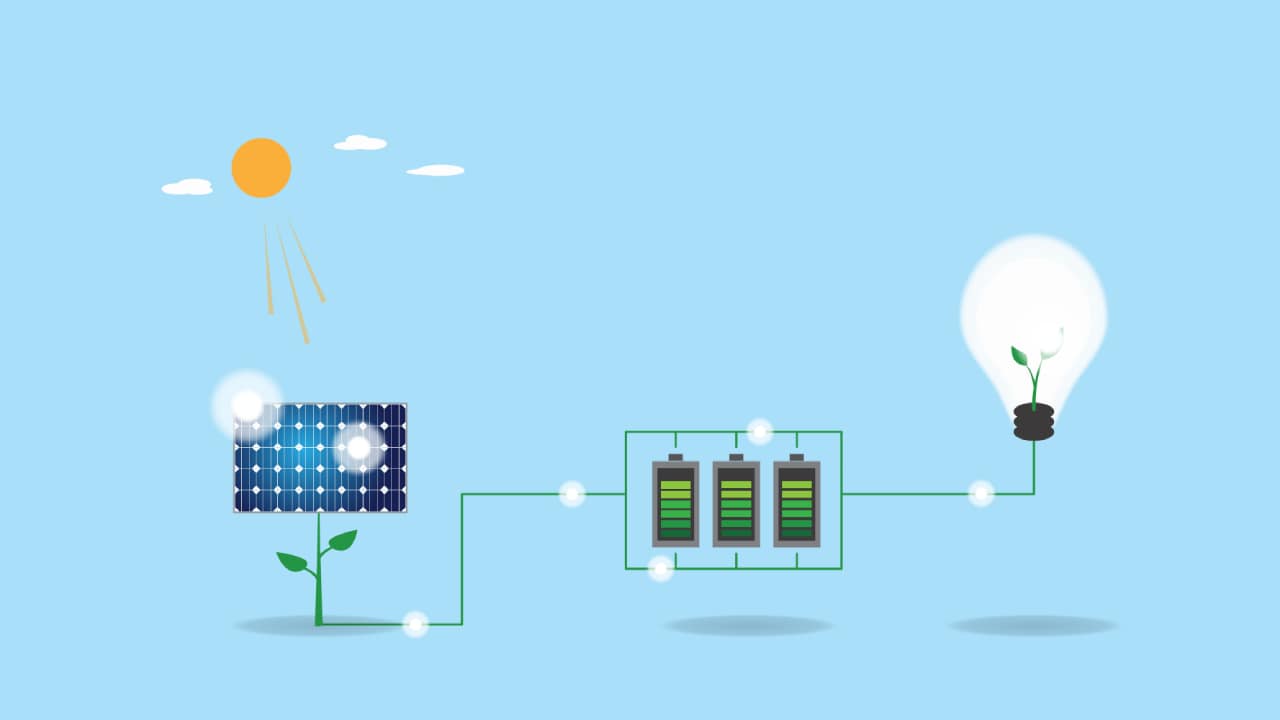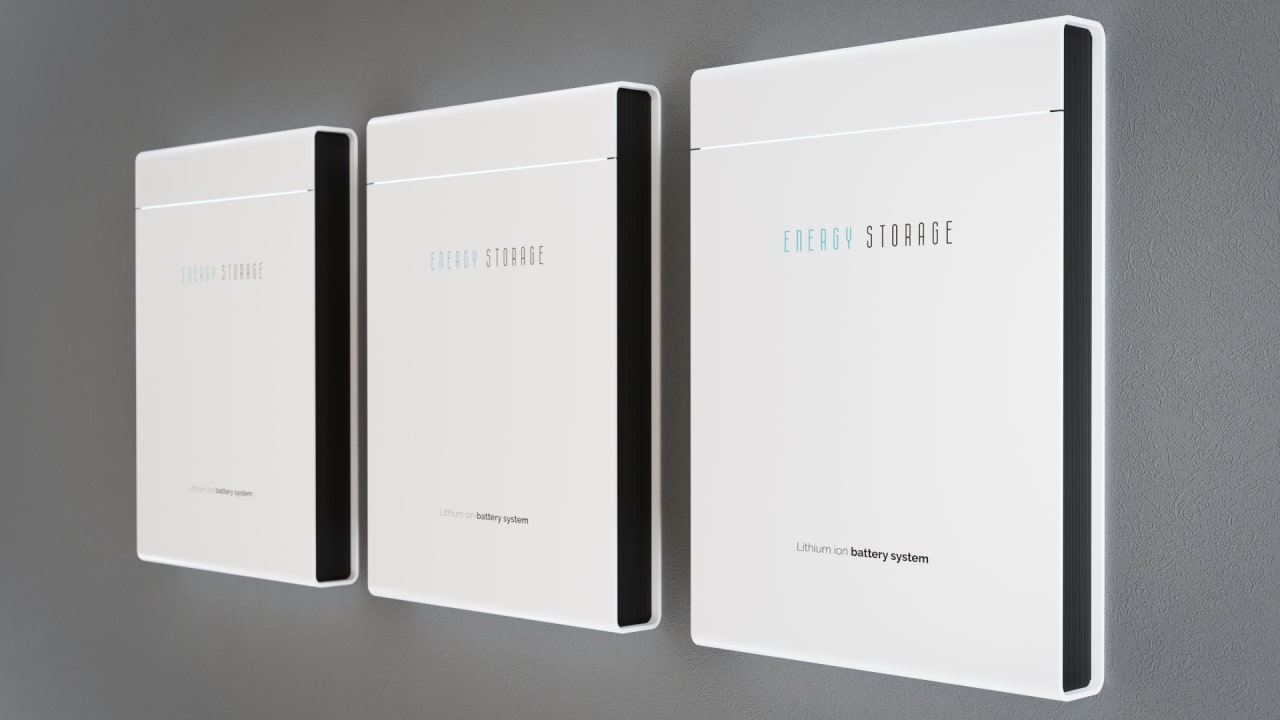Disclosure: FMB Home Picks is committed to delivering independent advice and reviews on home products and services. When you purchase through links on our site, we may earn an affiliate commission. Learn more Contact us.
Learn how solar batteries can maximise your solar panels’ efficiency, and save you money on your energy bills
Solar panels are an increasingly popular solution for UK homes – largely because of how much money they can save you on your energy bills.
But if your household is one of the estimated 1.5 million in the UK with solar panels, you’ll now be pondering a different question: are solar batteries worth it?
Below, we’ll explore the average cost, lifespan, and expected return on investment of a solar battery in the UK in 2024. We’ll look at the best (and the most cost-effective) batteries for your solar panels, answer your frequently asked questions, and explore how solar batteries work alongside the Smart Export Guarantee (SEG) – the scheme which allows you to sell any excess electricity your solar panels generate back to the grid for a profit.

Solar batteries can store any excess power generated by your solar panels to be used when the sun isn’t shining. (Image credit: Adobe)
Solar batteries store the excess energy your solar panels generate, instead of letting it go back to the National Grid.
You can then draw on this stored energy to power your home during times of the day – or year – when your solar panels aren’t generating as much electricity, such as on cloudy days or at night. You can also sell it back to the grid to save you even more on your energy bills – more on that later.
In the UK, solar batteries cost anywhere between £2,000 and £3,000 – it depends on the battery’s capacity, chemical composite, and life cycle, as well as the supplier you choose.
For example:

Yes, we expect solar batteries to become more affordable as the technology bomes more popular in the mainstream. The same thing happened with solar panels: they were expensive when first introduced, but their price has fallen over time.
Get solar battery quotes in your area
Discover how much a solar battery would cost for your system by answering a few quick questions

Lithium-ion solar batteries are more expensive initially, but they work out cheaper in the long run because they last longer. (Image credit: Adobe)
There are two types of chemical materials commonly used for solar batteries – lithium-ion and lead-acid. But which one is most cost effective, which lasts longer – and which one is better-suited to the needs of your UK home?
According to all evidence, lithium-ion solar batteries come out on top.
Although the initial cost of lithium-ion batteries is double the cost of their lead-acid counterparts (around £4,000 versus £2,000 for a 4kWh battery), Li-on batteries have a higher cycle lifespan, are more efficient, and perform better in hotter environments.
This makes them more cost-effective than their lead-acid counterparts: with recent data demonstrating a lead-acid battery would need to be around two and a half times larger in capacity than a Li-on one to achieve a similar cycle life.
So, why is cycle life such an important consideration when choosing the most cost-effective solar battery for your home?
Put simply, it’s because the more life cycles your solar battery has, the longer time it can perform at an efficient rate for. A longer lifespan also means you’ll incur fewer replacement costs going forward.
When comparing the two batteries with a 4kWh storage capacity, the differences are particularly noticeable:
So what about storage capacity? This reflects how much energy your solar battery can store. Storage capacity is important because the larger the capacity, the more energy the battery can store – and the more your home has to draw on when solar production is down. Another key metric, meanwhile – Depth of Discharge (DoD), or usable capacity – refers to the percentage of your solar battery’s storage space you’ll actually be able to use.
For example:
| Attributes | Lead-acid battery | Lithium-ion battery |
|---|---|---|
| Initial cost | £2,000 | £4,000 |
| Storage capacity | 4kWh | 4kWh |
| Depth of discharge | 50% | 90% |
| Life cycle (complete charge/discharge) | 1,800 | 4,000 |
| Cost x kWh x cycle | £0.556 | £0.278 |
Unlike solar panels – which typically last for around 20 to 30-years – solar batteries have a lifespan of between five and 15 years.
Are solar batteries worth it, then, knowing you’ll have to replace them in the future – perhaps even as soon as five years’ time? Let’s take a look at the average solar battery’s return on investment (ROI) to find out.
How much ROI can you expect to see on your solar battery? Let’s break down the numbers based on the lifespan of your average domestic solar array – 25 years.
First up, the cost of the batteries themselves. You’ll need to replace your solar battery around halfway through your solar panels’ lifespan, meaning you’ll have purchased two sets of batteries at a cost – depending on the type of solar batteries you select – of between £5,000 and £12,000 altogether.
Secondly, how much will solar batteries actually save you? Based on the average three-bedroom household, you can expect to see annual savings of around £186 on your energy bills.
Over 25 years – the average lifespan of your solar panels – that’s £4,650 of savings. Unfortunately, this isn’t quite enough to cover even the cheapest of solar batteries – and, over a 25-year period, you could be looking at losses of between £350 and over £7,000.
It’s not all doom and gloom, though – because households in England, Wales, and Scotland can still benefit from a Smart Export Guarantee (SEG) tariff. The SEG allows you to sell the renewable energy you solar panels generate back to the grid – for a profit. Under the SEG – which replaces the Feed-in Tariff, a similar scheme now closed to new applicants – all licensed energy providers with over 150,000 domestic customers must provide at least one SEG tariff.
However, the SEG doesn’t specify how much suppliers have to pay for your excess energy – it just has to be more than zero. What this means is that the rates you may receive for selling the electricity stored in your solar battery back to the grid will fluctuate massively – so it’s crucial to select the right SEG provider (called SEG ‘licensees’) to avoid these suppliers selling your short on your solar, and maximise the ROI or your solar battery.
| House Size | Panel power (kWp) | No. of panels | SEG Annual Profit |
|---|---|---|---|
| 1-2 bedrooms | 2.1 | 6 | £67 |
| 3 bedrooms | 3.5 | 10 | £112 |
| 4 bedrooms | 4.9 | 14 | £157 |
There are 13 different companies – which you can find on Ofgem’s list of licensed SEG suppliers – that offer SEG rates. You don’t also have to be receiving electricity from these companies to export to them – purchasing and selling electricity count as two separate services, and you can choose two separate companies to fulfil those needs. However, it does help if you use the same company for both, as you can usually receive a better SEG rate.

As of March 2024, the best SEG tariff in the UK comes from Octopus Energy’s “Intelligent Octopus Flux”, which pays an outstanding 35p/kWh. The catch, though, is that you’ll need to be an Octopus Energy customer, and you’ll also require a GivEnergy solar battery – other types aren’t compatible.
That said, Octopus Energy has another tariff – called “Octopus Flux” – which works with all types of solar battery. At 30p/kWh, though, it doesn’t pay quite as much. After that, the next best SEG tariffs come from OVO Energy (20p/kWh) and E.ON’s Next Export Exclusive, which pays 16.5p/kWh.
The only thing to watch out for with this E.ON one, however, is that this rate is only guaranteed for a fixed 12-month term: after that, you may be shifted to a variable (and potentially less favourable) rate.
Beyond this, British Gas, Good Energy, and Scottish Power all offer SEG tariff rates of 15p/kWh – providing you’re also receiving your energy from them. British Gas and Scottish Power’s per/kWh rates for non-customers are 6.4p and 12p, respectively – which illustrates the kind of cost savings on offer when you use the same company for selling you and purchasing your electricity.
If there’s no more storage space because your solar battery is full, the renewable energy your solar panels generate will simply stop being absorbed. Your solar panels will continue to generate energy, but it won’t be used or stored until there’s demand or space for it. Similarly, if you don’t have a solar battery you’ll need to use up, or sell to the grid, every kilowatt of electricity your panels generate – otherwise, it’ll go to waste. You’ll lose about 50% of the power your solar panels generate.
Are solar batteries worth it? Yes, if you can afford them. While we expect them to get cheaper as the technology becomes more widely available, right now solar batteries are expensive.
So, while they will help reduce your energy bills by enabling you to store the solar energy you produce – not only to power your home, but to sell to the National Grid as a bonus – these savings won’t ever offset the entirety of that hefty upfront investment.
That said, there are scenarios – if you want to live off-grid, for example – where solar batteries aren’t a nice-to-have, but a must-have.
Ultimately, though, solar batteries are less a savvy financial decision, and more a savvy environmental decision. By storing more of the energy you generate through your home’s solar panels, you’re reducing your household’s reliance on fossil fuel-based forms of energy – and, in the process, contributing to a cleaner, greener future.